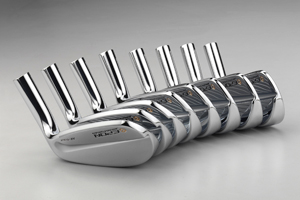Japanese golf brands
Andrew Akesson talks about some of the major Japanese golf brands, highlighting exactly what's out there and how it differs to our markets here in the UK.

Over the next few months all the major equipment manufacturers are going to be pushing their latest and greatest, such as PING's Rapture V2 or TaylorMade's R9 460, but did you know the Japanese golf market has been able to get hold of the R9 460 for quite a few months now, and that the Japanese version of the Rapture V2 irons have less offset and 1 degree stronger lofts.
Japan has always had a strong relationship with high quality forgings that date back to the days of the samurai sword, and although their forgings are far less dangerous these days (unless you're using golf clubs to chop your opponents limbs off), don't be fooled into thinking the quality is any less than the very best.
Mizuno and Miura are synonymous with the ‘buttery' soft feel their irons produce, providing a feel few other manufacturers are able to produce, but most of us will be familiar with their work. So instead I'm going to provide an insight into some other renowned Japanese brands, that some may argue produce far more innovative designs, whilst still producing that ‘feel' that can only come out of Japan.
Miura's biggest rival in terms of feel and performance is Epon, and if you are serious about your golf equipment then there is a strong chance that you have used a golf club forged by Epon, or to be more precise, Endo, who are Epon's parent company. Titleist and Nike have called upon Endo to forge their irons in the past, as they have largest forging house in the world at their disposal, forging steel to extremely high tolerances, meaning there are fewer anomaly's in each of their heads.
Endo consider themselves leaders in golf technology, and have taken all their knowledge from forging for other companies and put it into their own brand, Epon. Epon have been forging golf equipment for decades, whilst leading the field with their output. Their most recent offerings include drivers (their latest being the AF-151 and EMS), have crafted a hugely forgiving blade (AF-Tour) and players clubs such as the AF-501/2, irons that look like a blade from above, but in the long irons possesses an undercut that provides forgiveness on miss-hits, which is the same technology that TaylorMade have employed for their Tour Preferred irons.
One of Japan's ‘trendier' brands is PRGR, who brought out the odd-looking 'Egg' series. I say this because when you look down at the hybrid you see that half the cavity is missing, helping to create a low centre of gravity, which when paired with tungsten weights in the sole, equates to a higher and longer ball flight.
Pro Preference Model are a brand that have a very minimal output, although they recently released a beautiful blade at the beginning of the year, but this butter-knife isn't your average piece of kit. PPM has ground an undercut into the sole of each iron (something you may have seen on wedges in recent years), which they say cuts through the rough and uneven lies with ease.
Get the Golf Monthly Newsletter
Subscribe to the Golf Monthly newsletter to stay up to date with all the latest tour news, equipment news, reviews, head-to-heads and buyer’s guides from our team of experienced experts.
Club-head technology isn't the only thing that the Japanese golf manufacturers excel at though, as graphite shafts have long been something they have exported around the world. You may be familiar with names such as Fujikura, Diamana and Graphite Design, as these manufacturers names have long been amongst the leaders of shaft technology, with players such as Tiger Woods, Ernie Els and Sergio Garcia all having them in their bags, but there are also many ‘boutique' brands within the country that aren't very well known this side of the Pacific.
Names such as Quadra, Roddio and Mamiya Op are all names synonymous with shafts in Japan.
Quardra's Fire Express shafts are made from the highest quality retail carbon, which, to you and me, is 80t. Their shafts contain more glass than rubber particles, leading to shafts that kick back to their original shape far quicker and more predictably, meaning it's far easier to square the clubface up at impact. Wondering why they can do such high-grade carbon and no one else can? Its because they own the plant that ships out the graphite and Crazy decided to get in on the act and start making golf shafts themselves.
Roddio recently brought out their Pentacross range, which they say dampens vibrations and can also control the ball even when the sweet spot isn't hit, so if you hit it out of the toe or the heel, the shafts is able to minimise the damage by getting the ball to work back to somewhere near your target.
One of the most popular shaft companies in Japan is called Mamiya Op, who cater for all golfers swings and abilities. They recently helped out their sister company UST, in bringing out the new ATTAS shaft, which is aimed at players who are looking to bring their spin rates down, whilst still maintaining a medium-high ball flight, oh as well as hitting the ball further due to the high energy transfer. This shaft has been a massive hit on both the European and PGA tours, most notably making it into the bags of Ernie Els and Adam Scott.
Golf is treated in a very different manner in Japan compared to the rest of the world, as they treat the sport as a lifestyle instead of a game, meaning it's not unheard of for them to buy a set of irons for upwards of £10,000 and unfortunately for us, all of these products come at a premium price.
There are websites on the internet that enable you to get hold of this kit, but unless you live within reasonable distance from their shops you wont be able to try before you buy and so you'll be buying it blind. Be wary if you buy the gear from foreign websites though, as you'll probably have to pay the shipping price and you may also have to pay the taxman when your clubs reach these shores. But don't let this put you off, the craftsmanship and quality of materials that goes into making some of this kit is second-to-none and there's nothing more exciting than trying something new out.
Hopefully you'll find out why Japanese golf equipment has gathered such a cult following around the world.
-
 Rory McIlroy Wins The Masters In Playoff To Complete Career Grand Slam
Rory McIlroy Wins The Masters In Playoff To Complete Career Grand SlamThe Northern Irishman battled past Ryder Cup teammate, Justin Rose to finally seal his first Masters title and become the sixth man to win all four men's Majors
By Jonny Leighfield Published
-
 Did You Know The Masters Leaderboard Was Inspired By Fenway Park?
Did You Know The Masters Leaderboard Was Inspired By Fenway Park?The Masters leaderboards are an iconic and historic part of the Augusta National Major, but did you know about its origins and how it operates today?
By Matt Cradock Published